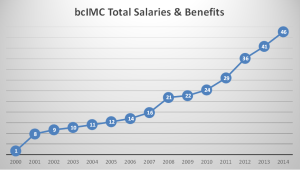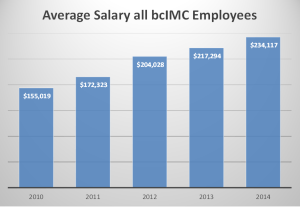There is however, one class of government employee that has done remarkably well. It does not involve nurses, paramedics and other vital healthcare workers. Nor does it include professional staff who should be working in natural resource, environment and finance ministries, nor school teachers who have been a favourite punching bag for a Premier who sends her child to an expensive private school few citizens can afford.
It is the management class, a small group of public servants, and one that is treated royally. Holding down directorships and other appointments that provide separate remuneration, some top earners only work part-time for British Columbia.
The United Kingdom’s High Pay Commission examined trends over 30 years and cited the example of Barclays, where top pay is now 75 times that of the average worker. The commission concluded that rich ancillary rewards are now a routine part of executive pay rather than dependent on performance. Among the driving forces:
“human nature, aspiration and endeavour are seen through a prism of self interest, or as some would put it “greed” as ever larger rewards are required to generate performance from individuals at the top of companies whose predecessors but a generation ago did the job for a tenth of the pay.
…As pay escalates for those at the top it creates a new point of comparison – a new norm. Executives look to finance,finance to private equity, and private equity to footballers – each proclaiming the other is where the problem lies.
Yet, research demonstrates little relationship between pay and performance. The notion of corelation is built into the philosophy of management and unquestioned because decision makers and overseers are almost exclusively drawn from groups who are beneficiaries of the mantra. As in a game of playground leapfrog, people take turns advancing forward. This self reinforcing cycle ratchets up executive compensation. According to business writer David Bolchover,
It’s not a manifestation of capitalism, it’s a corruption of capitalism. People are creaming off the benefits without taking any risk. It’s entirely right that people who improve the economy and people’s lives and take risks get well paid, but these people are not taking risks and getting a huge pay packet based on a myth.
“Evidence does not suggest that performance related pay is always actually linked to performance.”
In British Columbia, pension funds create an unprecedented pool of public capital: about $115 billion. But, there is little oversight and no fund placements or guidelines for investment are subject to citizen review. Members of the legislature pay zero time evaluating investment practices and philosophy and, given the absence of independent review, the potential for personal gain and misuse of funds is significant. bcIMC invests in fossil fuels, tobacco, deadly arms, gambling and companies involved in criminality and unethical practices.
In this blog, I’ve pointed out repeatedly that executive salaries and administrative costs of the Washington State Investment Board are about one-third of those paid by bcIMC. Over time, particularly when currency exchange gains are removed, the American agency has had superior results. (From 2011 to 2014, bcIMC’s American dollar investments increased 15% by exchange gains alone.)
As you scan the list of payments to bcIMC executives, consider the BC government’s financial treatment of other public servants. Paramedics, for example, look forward to five years of annual wage increases that average about $7 a week while, 20% of bcIMC staff averaged raises of $800 weekly and as much as $4,000 a week, in each of the past five years, during a period of so-called restraint.
Consider also if bcIMC is an out-of-fashion old-boys club. None of the six highest paid people are female and only seven of the top paid 40. Yet their Annual Report paints a different picture. The “global governance team” is pictured as one man and five woman. In the words of Phaedrus, “Things are not always what they seem…”
Categories: BC Investment








Considering “ BC government's financial treatment of other public servants”, there is a Communications Manager job posting in the Tech, Innov & Citizens' Serv department of the Government Communications and Public Engagement Ministry/Branch. Salaries for this Manager position are listed as $67,648.17 to $84,560.21 (with Directors making $105,700.66). I am not certain of current wage scales for paramedics…. preliminary research shows top rates of around $80,000….if I am wrong please correct me. Looking at skillsets and value added (to economy and/or society in general) for paramedics, an underperforming BCIMC employee is not worth any multiple of $80,000…nevermind 5 times.
But that government communications position ….now we are talking. The BC Liberals are getting extraordinary value for the wage offered. One could say life-saving . Once massaged by these professionals there is no hint of government ineptness or impropriety…..above and beyond the call of duty to get it all wrapped up and presented to our mainstream media. Look at all the time and money our newspapers save by eliminating the need for editing before publishing. Value added for sure.
LikeLike
The Justice Institute states,
“Salary for Primary Care Paramedics can vary greatly depending on whether you work for an ambulance service or in industry.The average wage range for a PCP is approximately $20.00 – $30.00 per hour.”
I understand the PCPs spend years working part-time at the lower part of the range and may earn only $20K to $35K. Advanced Care Paramedics, who are highly skilled and extensively trained, max out at about $60-65K.
Amazing is it not that we value paper pushers more highly than individuals who routinely save lives?
LikeLike
Hello Mr. Farrell. Most of us don't. It's other paper pushers who value paper pushers. Most folks that do real tangible measurable work are under compensated because paper pushers get to determine their “value”. The revolving door CEO fraternity excuses poor performance at the first chance and rewards mediocrity handsomely.
LikeLike
The photo, with one token male, one token Asian female, and the preponderance of caucasion females is as misleading and fallacious as their justification for highly inflated and undeserved salaries and “merit” pay.
LikeLike
The investment management board established under the Public Sector Pensions Plans Act is responsible under that act for selecting and appointing a chief investment officer and determining that officer’s salary. It is also responsible for establishing an employee classification system and compensation scale, including performance bonuses. The investment management board consists of seven directors appointed as follows:
(a) one director appointed by the College Pension Plan board from among its members;
(b) one director appointed by the Municipal Pension Plan board from among its members;
(c) one director appointed by the Public Service Pension Plan board from among its members;
(d) one director appointed by the Teachers' Pension Plan board from among its members;
(e) two directors, representative of clients of the investment management corporation, other than those referred to in paragraphs (a) to (d), appointed by the minister of finance;
(f) one other director appointed by the minister.
The director appointed under subsection (3) (f) is designated as chair of the investment management board.
Appointments are for a three-year term, may be renewed, and may only be rescinded by the party that made the appointment.
It seems that the bcIMC is being run by a board that, like the Translink board, has been essentially running out of control and in a different direction than public expectations when it comes to salaries and bonuses. And like the TransLink board, it isn’t going to change direction without legislation. All eyes and comments on these salaries and bonuses should be pointing directly to Minister de Jong.
LikeLike
R3
By the rich
For the rich
Of the rich
BC Libs r3 party?
http://www.theprovince.com/news/Smyth+Tuesday+budget+will+leave+sour+taste+some+people+mouths/10818543/story.html
1/4 billion dollar giveaway annually in BC to top 2 percent.what about the 98 percent?
https://www.bcndp.ca/newsroom/christy-clark-ignores-families-gives-top-income-earners-break
LikeLike
The boards that direct the bcIMC board each have a common guiding hand: the BC Liberal government.
They have representatives from unions but also from employers groups and the province. Since the province typically directs the employer groups (such as BPSEA), that results in an imbalance of power. As a result, the pension agencies reflect policies desired by the provincial government and they serve as places for generous patronage rewards.
LikeLike
A Facebook comment by Michael Nenn
I appreciate one thing only. That if I were in their shoes I'd be sick to my stomach knowing that my salary increased by 445k (Mary Garden) in four years while child poverty stayed the same. Proof that this entire system is dysfunctional. Perhaps it's time to start a brand new party that will run on a single issue of if elected, it will bring in electoral reform with public consultations while keeping the status quo on all other government laws and practices. Once the new electoral reform legislation is in place it will immediately go to the crown and drop the writ for another election only this time to run on sweeping changes to the existing system as per the hopefully more realistic political representation of actual BCers instead of the smoke and mirrors show we currently have.
LikeLike
Bc liberal trick le down tax economics inequality for the 98 percent of BC
Graph.?
https://mobile.twitter.com/CCPA_BC/status/567808111177637888/photo/1
Billion dollar tax break every 4 years for top 2 percent
LikeLike
Quiz:
How many companies in BCiMC's portfolio are part of the Military Industrial Complex?
http://www.bcimc.com/publications/pdf/Inventory/Inventory20140331.pdf
LikeLike
So, in the last 30 years when productivity has risen steadily, wages have remained flat. Meanwhile, corporate hacks' wages go up tenfold. Do I have that right?
LikeLike
According to the High Pay Commission in the UK, in 1980, the top executive at Barclays earned 13 times the annual pay of the average British worker. The pay today equals 169 times average UK worker pay.
By North American standards, the Barclays CEO is not particularly well paid.
Read more at Inequality.org
The Best Case Yet for Ending CEO Pay Excess
LikeLike
I found 10 companies in a few minutes, just for a start. Lots more I'm sure.
LikeLike
Looks like that Barclays CEO should look for a job in BC
LikeLike